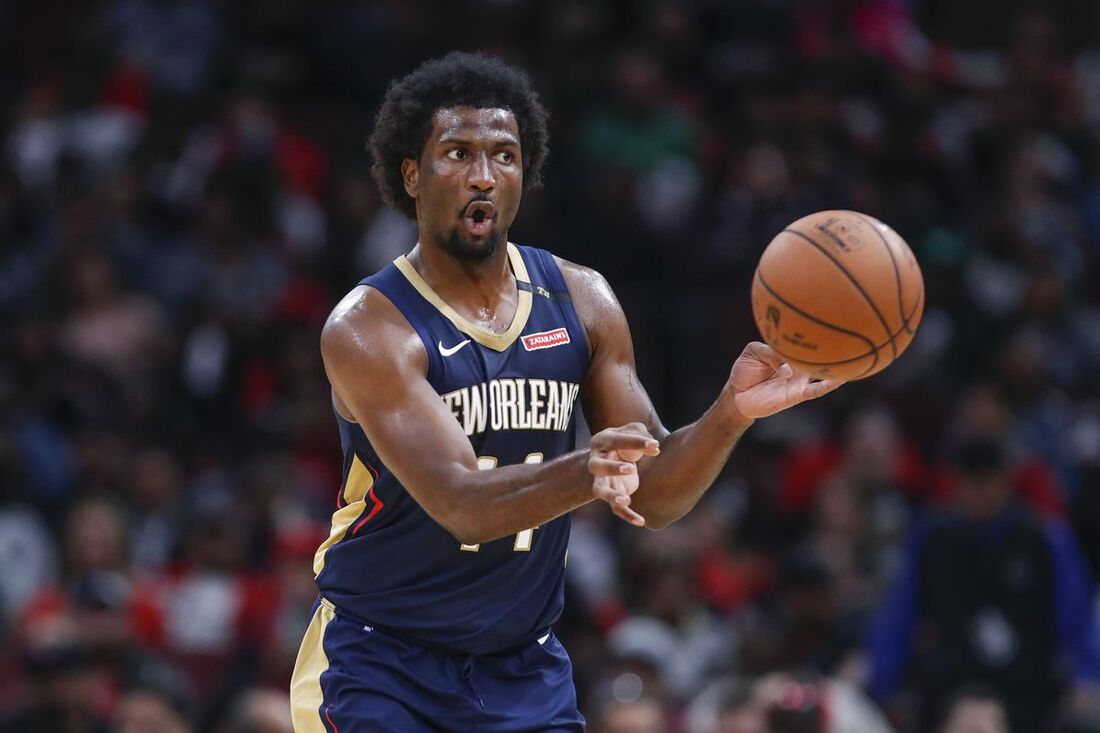|
This article is a facsimile of an earlier version published on The Basketball Writers (TBW), which recently closed its doors. By the quarter mark of an NBA season, one has a good feel for who each team is, what they're running and how to push the "small sample size" argument closer to the back burner. At 9-7, the New Orleans Pelicans are clinging to the thick of things in the West behind Anthony Davis who has established himself as an MVP frontrunner.
His per game averages (27.5 points, 12.7 rebounds, 4.9 assists, 2.8 blocks, 1.3 steals on 48% shooting) are insane. Even more mind-boggling is his net plus-minus of 26.3. These Davis-led Pelicans are second in the league in points per game and fourth in pace. Any lineup with Anthony Davis as the full-time 5-man—and any team conducted by Alvin Gentry—is bound to be at its best when forcing the tempo and playing with prestissimo. That comes with a price, though. Davis currently leads the league in minutes per game. Jrue Holiday—the team's unheralded All-Star and perhaps the best on-ball defender in the league right now—is fourth by the same metric. The season is young, but the coach in me wonders about the long-term consequences of playing fast while burdening your stars with a heavy minute load. Gentry isn't doing his Alpha Males any favors with his bench deployment. Exactly half of the Pelicans' sixteen games have seen eight or fewer players log ten minutes or more. For context, the oft-criticized rotations of Tom Thibodeau have produced four such games. A large portion of the minute allocation is the lack of trust Gentry has in his bench. Players like Jahlil Okafor, Frank Jackson, Cheick Diallo and Tim Frazier have all underperformed this season. Solomon Hill and Elfrid Payton have been injured; Hill's shooting has been woeful even when healthy. If players don't earn the trust of a coach to lengthen their roles, is Gentry really deserving of blame for avoiding them? The return of Payton to full health may eradicate this issue altogether and balance the Pelicans' rotation for the long-term. Still, there's a queasy feeling that comes from knowing a roster is one injury away from stretching itself too thin. The Pelicans rely on their core five players for a large amount of offense. Davis, Holiday, Nikola Mirotic, E'Twaun Moore and Julius Randle combine for 78 percent of the team's offense. Randle has scored 276 points this season off the bench; the next highest total for a bench player: Ian Clark's 74. That poor bench was in full display several times the last few weeks. Against the Minnesota Timberwolves on November 14th, the Pelicans bench played 57 minutes, totaling 5 points and 7 turnovers on 11 shots while going 0-of-5 from three. New Orleans lost by seven. On several occasions within the last few weeks, Davis played the entire first quarter (and stayed on the floor for the start of the 2nd quarter). That type of substitution pattern is incredibly rare in today's NBA, where most coaches opt to stretch their star player's rest through the quarter break. All the factors you'd look for in a team that struggles with depth and fatigue don't indicate a problem for the Pels yet. In those eight games where Gentry has only played eight players ten-or-more minutes, they are 8-2. There's a definite correlation between the scores of those games and the need to shorten the bench. The Pels are actually better in the second half of games (+4.7) than in the opening frame (-2.7), and they're 7-0 when the build a double-digit lead and don't fade when they build a large lead. Moore, along with newly-minted starter Wesley Johnson, are both shooting an absurd 48 percent from three-point range. Their scorching-hot starts are unlikely to remain over the entire season and will course-correct soon enough. Who picks up the slack for New Orleans when that happens? Simply surrounding Davis with a bunch of stand-still shooters and lanky, feisty defenders is a great strategy. The issue might be that there aren't enough of them. Early in the season, there's no solid proof that New Orleans' lack of sturdy bench production beyond Julius Randle is to their detriment. This is not meant to raise a red flag where there isn't an issue. It is reasonable to expect these are issues that catch up to New Orleans in February and March, while the Western Conference playoff race is at its zenith: When injuries strike through a long season, and when players who are hot suddenly are not. Luckily for Dell Demps, there's plenty of time for the Pelicans' general manager to address their lack of depth. Three players—Jahlil Okafor, Kenrich Williams and Tim Frazier—have partial or non-guaranteed contracts, giving New Orleans a little flexibility throughout the winter. They've used zero minutes from two-way players and can monitor the G-League for parts that can slide into the rotation, which they've done successfully over the last two seasons. Playing fast has a cost, especially on superstars that log heavy minutes in their system. Everything about Anthony Davis shows he's superhuman and can withstand any role asked of him; he's still the most undervalued superstar in the league. The costs may weigh heavier on the supporting cast in New Orleans, and they're costs that won't show up on the bill until later in the season. As easy as it is to love how the Pelicans are playing now, there's a clear Achilles heel that's beginning to develop in the Bayou.
0 Comments
Leave a Reply. |
Adam SpinellaHead Boys Basketball Coach, Boys' Latin School (MD). Archives
September 2021
Categories |

 RSS Feed
RSS Feed
